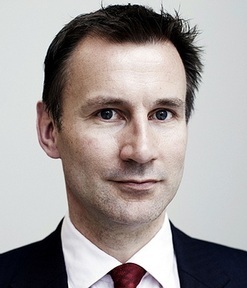Jeremy Hunt reveals ‘fundamental changes’ to the NHS to improve the care of older people
Health Secretary Jeremy Hunt has announced plans to make “fundamental changes” to the NHS in an attempt to improve the care of older people.

Yesterday he pledged the Government’s commitment to improving the care of vulnerable older people, who are often admitted to A&E departments because they are unable to access the care and support they need elsewhere.
Over the last 10 years, the number of people visiting A&E departments in England has risen by 32 per cent, with people over the age of 65 representing 68 per cent of NHS emergency bed use. The Department of Health believes they are the group most at risk of failures to provide seamless care due to their vulnerability.
During his speech yesterday Mr Hunt revealed how 53 NHS Trusts will spend £250m of £500m extra funding made available by the Government to tackle the pressures on A&E departments, with some of the cash being used to integrate services, increase district nursing and improve social care.
He said: “This winter is going to be tough – that’s why the Government is acting now to make sure patients receive a great, safe service, even with the added pressures the cold weather brings – but this is a serious, long-term problem, which needs fundamental change to equip our A&Es for the future.
“In the long-term, I want a 24/7 service which recognises patients as individuals and looks out for them proactively. Starting with our most vulnerable, this Government is going to support the NHS in doing exactly that.”

The move has been welcomed by Care and Support Minister Norman Lamb, who is involved in overseeing how £3.8bn integrated care funding will be used across the NHS and social services. He said: “We want to build a stronger economy and a fairer society. That’s why we recognise the need to join up services around people’s lives so that vulnerable people get better care, closer to home, and the NHS is sustainable for the long-term. People shouldn’t fall between the cracks in services, being pushed from pillar to post and not getting the care they need simply because these systems do not work together.
“We have been talking about integrated care between the NHS and social care for years, and now the Government has put its money where its mouth is. We have created a £3.8bn Integration Transformation Fund to make sure everyone gets a properly joined up service in order to get the care they need from whoever is best placed to deliver – the NHS or the local authority.”
Yesterday Mr Hunt also revealed that the treatment of flu will be a priority for the Government. The disease has a huge impact on the NHS, with around 750,000 people visiting their GP for treatment of symptoms and 27,000 being admitted to hospital each year as a result of the flu. In an attempt to reduce this number, Mr Hunt revealed that a national campaign will be launched to protect those most at risk of developing flu and that two- and three-year-old children will be vaccinated against the disease in order to prevent it from potentially spreading. NHS staff will also receive flu jabs.
Commenting on the announcement, Dame Sally Davies, chief medical officer, said: “Frontline staff, by the very nature of their jobs, deal with people who are unwell every day. Simply by having the flu vaccine, as recommended by the GMC, NHS staff can play an important role in not picking up the flu virus and passing it on to other patients – often people who are already poorly and vulnerable to infection.
“Currently less than half of frontline NHS staff get vaccinated against flu – and in some hospitals, this figure drops to fewer than one in five. I urge all frontline staff to get vaccinated and encourage their colleagues to do so too.”
Latest News
 29-Jul-24
Dementia Bus gives carehome.co.uk staff insight into life with dementia
29-Jul-24
Dementia Bus gives carehome.co.uk staff insight into life with dementia
 01-Mar-24
Find out the top care homes in 2024
01-Mar-24
Find out the top care homes in 2024
 21-Mar-23
UK's top care homes in 2023 revealed
21-Mar-23
UK's top care homes in 2023 revealed
 03-Jan-23
carehome.co.uk launches free care helpline
03-Jan-23
carehome.co.uk launches free care helpline
 13-Dec-22
5 mins with Emily Whitehurst, chief operating officer for Constantia Healthcare
13-Dec-22
5 mins with Emily Whitehurst, chief operating officer for Constantia Healthcare